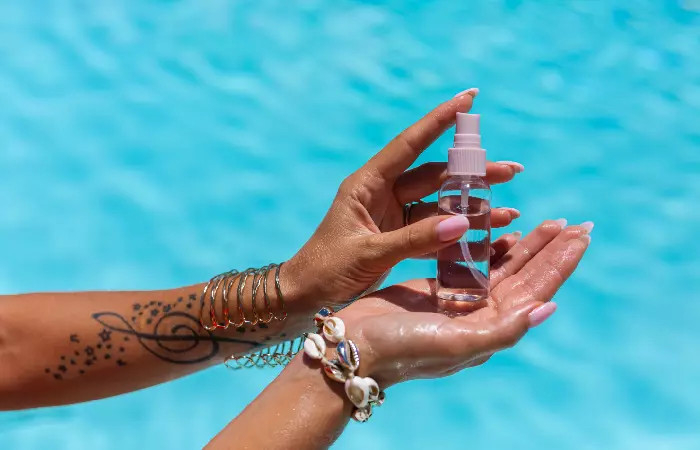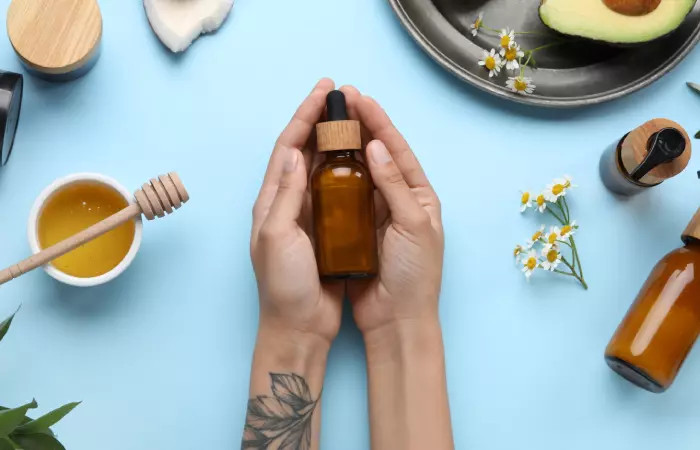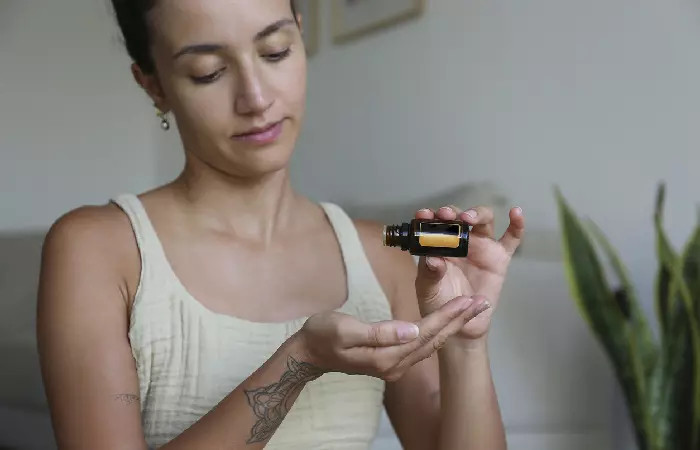Are you curious about the impact of vitamin E on your tattoos? Does Vitamin E Fade Tattoos? At tattooat.com, we’re diving deep into the facts surrounding vitamin E oil and its effects on tattoo artistry and tattoo care. Whether you’re considering your first piece of ink or you’re a seasoned collector, understanding how to properly care for your body art is essential, and we’re here to provide clarity. Discover the truth about vitamin E, tattoo aftercare, and how to keep your ink looking vibrant with tattoo preservation techniques.
1. What Is Vitamin E Oil and Why Is It Used on Tattoos?
Vitamin E oil is often touted as a beneficial treatment for tattoos, but is it really effective? Vitamin E oil is a fat-soluble nutrient and antioxidant commonly used in skincare. The idea behind its use on tattoos stems from its potential benefits for wound healing and skin health. It’s believed to protect the skin from oxidative stress and promote healing, which are crucial aspects of tattoo aftercare. Many believe it helps maintain the vibrancy of older tattoos. However, the actual effectiveness of vitamin E oil on tattoos is a subject of much debate.
While some swear by it, others are wary, as scientific evidence supporting its specific use for tattoos is limited. Some studies, like those published in the Journal of the American Academy of Dermatology, suggest that topical application of vitamin E can, in rare cases, lead to skin conditions like contact dermatitis.
 Vitamin E oil being applied to a healed arm tattoo for moisturizing
Vitamin E oil being applied to a healed arm tattoo for moisturizing
The use of vitamin E for tattoo aftercare requires careful consideration due to conflicting views and potential risks. It’s best to consult with a healthcare professional or a tattoo artist before incorporating it into your aftercare routine.
2. What Are the Potential Benefits of Vitamin E Oil for Tattoos?
Although the evidence is mixed, what are the potential advantages of using vitamin E oil on tattoos? Here’s a look at some of the potential benefits:
- Skin Hydration: Vitamin E oil is known for its moisturizing properties, which can help keep the skin hydrated and prevent dryness in the tattooed area.
- Reducing Itchiness and Irritation: By keeping the skin moisturized, vitamin E oil may alleviate itchiness and irritation associated with the tattoo healing process.
- UV Protection: Some believe that vitamin E oil can provide a degree of protection against UV damage, potentially preventing fading of the tattoo ink.
- Preventing Tattoo Aging: The antioxidant properties of vitamin E oil may help combat free radicals, potentially preventing premature aging and fading of the tattoo.
 A woman applying vitamin E oil spray to her thigh tattoo in a bikini
A woman applying vitamin E oil spray to her thigh tattoo in a bikini
It’s important to note that these benefits are largely based on anecdotal evidence and have not been definitively proven through scientific research.
3. Can Vitamin E Oil Help with Tattoo Healing?
Does vitamin E oil speed up the tattoo healing process? Research indicates that vitamin E may promote surgical wound healing due to its antioxidant benefits. However, other studies suggest that vitamin E may not aid in reducing healing time and is linked with adverse effects and risk of chronic skin conditions, like contact dermatitis. Tattoos are essentially open wounds, so the idea is that vitamin E oil could potentially aid in their healing.
However, it’s crucial to approach this with caution. While vitamin E oil may have some beneficial properties, it’s essential to follow the aftercare instructions provided by your tattoo artist. Proper cleansing, moisturizing, and protecting the tattoo from sunlight are still key to ensuring proper healing and preventing infection.
4. Does Vitamin E Oil Bring Out the Tattoo Color?
Can vitamin E oil make tattoo colors appear more vibrant? Anecdotal evidence suggests that applying vitamin E oil to older tattoos may make their colors appear vibrant and significantly deeper. However, it is important to note that the oil does not actually enhance the vibrancy and depth of colors in your tattoos. They appear that way only due to the shine that the oil adds to the skin.
 Close-up of tattooed hands holding a bottle of vitamin E oil
Close-up of tattooed hands holding a bottle of vitamin E oil
While vitamin E oil might create the illusion of enhanced color, it’s not a substitute for proper tattoo aftercare and sun protection.
5. Does Vitamin E Oil Fade Tattoos Over Time?
The crucial question: does vitamin E fade tattoos? Some individuals believe that applying vitamin E oil can help reduce the appearance of scars but may also indirectly contribute to tattoo fading. However, current evidence doesn’t fully support this claim. In fact, it suggests that topical vitamin E use may sometimes cause side effects like contact urticaria and worsened appearance of scars.
Moreover, the tattoo process involves injecting ink into the dermis, the middle layer of skin approximately 1.5 to 2 mm below the surface. This implies that even if vitamin E fades surface scars, it cannot affect the ink present in the deeper layers.
To maintain the vibrancy of your tattoos, it’s essential to protect them from excessive sun exposure and avoid harsh chemicals that can cause fading.
6. When Is the Best Time to Apply Vitamin E Oil on Tattoos?
If you choose to use vitamin E oil, when is the right time to apply it? You should avoid applying vitamin E oil on a fresh tattoo with broken skin. Instead, allow the initial tattoo healing process to pass before applying any ointments or oils.
This means that once you remove the bandage provided by the tattoo artist, wait for at least 1 to 2 weeks. During this time, follow your tattoo artist’s prescribed aftercare routine, like using an antibacterial soap and gentle, fragrance-free moisturizer on the new tattoo. Then, as the third-week approaches, your tattoo may begin to peel. This is when you can apply vitamin E oil on your flaking skin, 1 to 2 times daily, after cleansing your tattooed skin as recommended by your tattoo artist.
 A woman pouring vitamin E oil into her palm to apply on her arm tattoo
A woman pouring vitamin E oil into her palm to apply on her arm tattoo
Always perform a patch test before applying vitamin E oil to your entire tattoo, as it may not suit all skin types.
7. How Should Vitamin E Oil Be Applied to Tattoos?
If you decide to use vitamin E oil, how should you apply it for the best results? Here are some general tips:
- Clean Your Tattooed Skin: Gently clean your tattooed skin with a mild, fragrance-free soap and warm water. Use a clean, soft towel to pat the skin dry. Avoid rubbing to prevent irritation.
- Apply The Oil: Once your tattooed skin is clean and dry, take 2-3 drops of diluted vitamin E oil and use your fingertips or a clean cotton swab to apply it to the body art. If you have pure vitamin E oil, you may dilute it with carriers like coconut oil in a 1:4 ratio. You may also use products like topical vitamin E serums and creams instead of oil, on the recommendation of your tattoo artist. However, these vitamin E products may also contain other ingredients like lavender essential oil, hydroxy acids, and tea tree oil that may be harsh on the healing tattoo and lead to skin irritation. Always check the ingredient list of these products to avoid such adverse effects.
- Repeat As Needed: You may reapply the oil 2-3 times a day, or as needed. However, avoid overdoing it, as using excessive amounts may trap moisture, clog pores, and lead to skin irritation and breakouts.
 Illustration showing how and when to use vitamin E oil for tattoos
Illustration showing how and when to use vitamin E oil for tattoos
Remember, using vitamin E for tattoos is not a substitute for proper aftercare. Always follow the aftercare instructions provided by your tattoo artist.
8. What Are the Risks and Side Effects of Using Vitamin E Oil on Tattoos?
What are the potential downsides of using vitamin E oil on tattoos? While vitamin E oil is often praised for its benefits, it’s essential to be aware of the potential risks and side effects:
- Allergic Reactions: Some individuals may be allergic to vitamin E oil, leading to skin irritation, redness, itching, or rash.
- Contact Dermatitis: Topical application of vitamin E oil can sometimes cause contact dermatitis, a type of skin inflammation characterized by redness, itching, and blistering.
- Clogged Pores: Vitamin E oil has a thick consistency, which can clog pores and lead to breakouts, especially in acne-prone skin.
- Scarring: In some cases, vitamin E oil may worsen the appearance of scars rather than improve them.
If you experience any adverse reactions after applying vitamin E oil to your tattoo, discontinue use immediately and consult with a healthcare professional or tattoo artist.
9. What Alternatives Can Be Used for Tattoo Aftercare?
If vitamin E oil isn’t the best choice, what alternatives can you use for tattoo aftercare? Fortunately, there are several effective alternatives for promoting tattoo healing and maintaining skin health:
- Fragrance-Free Moisturizers: Look for moisturizers specifically designed for tattoo aftercare. These products are typically fragrance-free, hypoallergenic, and non-comedogenic, reducing the risk of irritation and clogged pores.
- Tattoo Balms: Tattoo balms containing natural ingredients like shea butter, cocoa butter, and beeswax can provide deep hydration and protection for the skin.
- Aloe Vera: Aloe vera gel has anti-inflammatory and cooling properties that can soothe irritated skin and promote healing.
- Sunscreen: Protecting your tattoo from sun exposure is crucial for preventing fading and damage. Use a broad-spectrum sunscreen with an SPF of 30 or higher whenever your tattoo is exposed to sunlight.
| Alternative | Benefits | Considerations |
|---|---|---|
| Fragrance-Free Moisturizer | Hydrates skin, reduces irritation | Choose non-comedogenic options |
| Tattoo Balm | Deeply hydrates, protects skin | Check ingredients for allergies |
| Aloe Vera | Soothes irritation, promotes healing | Use pure aloe vera gel |
| Sunscreen | Prevents fading and damage from sun exposure | Apply liberally and reapply every two hours |
Remember to always follow the aftercare instructions provided by your tattoo artist and choose products that are suitable for your skin type.
10. What Do Tattoo Artists Recommend Regarding Vitamin E Oil?
What’s the consensus among tattoo artists regarding vitamin E oil for tattoo aftercare? Many tattoo artists have mixed opinions about the use of vitamin E oil. Some artists believe that it can be beneficial for moisturizing the skin and promoting healing, while others caution against its use due to the potential for allergic reactions and clogged pores.
According to Ashutosh Bairagi, a professional tattoo artist, it’s essential to consult with your tattoo artist before using any products on your new tattoo. They can provide personalized recommendations based on your skin type, tattoo design, and healing process.
Ultimately, the decision to use vitamin E oil for tattoo aftercare is a personal one. Weigh the potential benefits and risks, consider your skin type, and consult with a tattoo artist or dermatologist before making a decision.
Looking for more information and inspiration? Visit tattooat.com, where you can explore a vast array of tattoo designs, discover talented artists, and access expert advice on tattoo aftercare. Find the perfect design, connect with a skilled artist, and learn everything you need to know about tattoo care at tattooat.com.
Frequently Asked Questions
1. Are aloe and vitamin E good for tattoos?
Yes, aloe and vitamin E are good for tattoos that have passed their initial healing phase. Research suggests that aloe vera has anti-inflammatory and healing properties that may help reduce swelling and skin damage that occurs during the tattooing process. Additionally, vitamin E may also help with the healing process. Always consult your tattoo artist or dermatologist before using these ingredients and perform a patch test to avoid potential side effects, especially if you have sensitive skin.
2. Can I use coconut oil and vitamin E for tattoos?
Yes, you may use coconut oil for tattoos that are past their initial healing stage. It not only moisturizes the area but also has antimicrobial and anti-inflammatory properties, which may help prevent tattoo infections and reduce swelling. Vitamin E has hydrating, photoprotective, and anti-aging benefits, which may help keep your tattoo looking vibrant and fresh. That said, it is recommended to consult a tattoo artist or dermatologist before using these ingredients.
3. Can I use vitamin E oil on my tattoo if I have sensitive skin?
Vitamin E can be harsh on sensitive skin. SO, if you want to use it for tattoo healing, mix it with a cream or lotion in a small quantity. Perform a patch test first to check your skin’s tolerance level. And if irritation occurs, stop using it and consult your tattoo artist or a dermatologist for alternative aftercare options.
4. Can vitamin E oil remove tattoos?
No, vitamin E oil cannot remove tattoos. Tattoos involve injecting ink into the dermis layer of the skin, while vitamin E oil primarily affects the surface layers. Tattoo removal typically requires procedures like laser tattoo removal that target the ink particles in the dermis.
5. What are the signs of a tattoo healing properly?
Signs of a tattoo healing properly include: reduced redness and swelling around the tattoo area, formation of a thin layer of scabbing, peeling of the scabs (do not pick them), and gradual fading of any initial discomfort or itching. The tattoo should also appear less shiny and more matte as the skin heals.
6. What should I avoid during the tattoo healing process?
During the tattoo healing process, avoid: excessive sun exposure, swimming in pools or open water (due to the risk of infection), wearing tight clothing that may rub against the tattoo, scratching or picking at the tattoo, using harsh soaps or chemicals on the area, and engaging in activities that may cause excessive sweating.
7. How long does it typically take for a tattoo to heal?
The typical healing time for a tattoo varies depending on factors such as the size and location of the tattoo, individual healing rates, and aftercare practices. In general, the initial healing phase (where the tattoo is most vulnerable) lasts around 2-3 weeks, while complete healing can take anywhere from 2 to 6 months.
8. Can I use Vaseline on my tattoo during the healing process?
While some people recommend using Vaseline on tattoos during the healing process, it is generally not recommended by tattoo artists. Vaseline is a petroleum-based product that can trap moisture and prevent the skin from breathing, potentially leading to clogged pores and delayed healing. It’s best to use tattoo-specific aftercare products or fragrance-free moisturizers instead.
9. What is the best way to protect my tattoo from the sun?
The best way to protect your tattoo from the sun is to apply a broad-spectrum sunscreen with an SPF of 30 or higher to the tattooed area whenever it is exposed to sunlight. Additionally, you can wear protective clothing, such as long sleeves or hats, to shield the tattoo from direct sun exposure. Avoid prolonged sun exposure, especially during peak hours.
10. How often should I moisturize my tattoo during the healing process?
You should moisturize your tattoo 2-3 times a day during the healing process, or whenever the skin feels dry. Apply a thin layer of moisturizer to the tattooed area after cleansing it with mild soap and water. Avoid over-moisturizing, as this can also hinder the healing process.
Ready to explore the world of tattoos? Visit tattooat.com now to discover designs, artists, and expert advice. Your perfect tattoo journey starts here.
